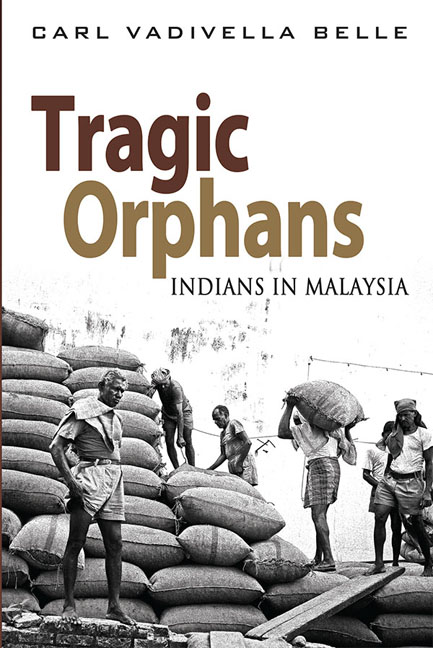Book contents
- Frontmatter
- Contents
- Acknowledgements
- List of Abbreviations
- Introduction
- 1 The Malay Peninsula: Early History, Melaka and the Colonial Setting
- 2 European Colonialism and the Malay Peninsula
- 3 India and the Development of British Ideologies of Empire
- 4 British Governance of Malaya
- 5 Slavery and Indentured Labour
- 6 Indian Indentured Labour in Malaya
- 7 Kangany Labour in Malaya
- 8 Other Indian Immigration
- 9 Indian Political Development to 1941
- 10 The Japanese Invasion, Subhas Chandra Bose and Indian Wartime Nationalism
- 11 The Post–war Period: Reform and Repression: 1945–48
- 12 From Federation to Merdeka
- 13 From Malaya to Malaysia: Singapore, 13 May and the New Economic Policy
- 14 The Mahathir Years: A Changing Malaysian Landscape
- 15 Abdullah Badawi, Islamization, and the Rise of Hindraf
- 16 Najib and 1Malaysia: A New Deal?
- Conclusions
- Bibliography
- Index
2 - European Colonialism and the Malay Peninsula
Published online by Cambridge University Press: 06 June 2017
- Frontmatter
- Contents
- Acknowledgements
- List of Abbreviations
- Introduction
- 1 The Malay Peninsula: Early History, Melaka and the Colonial Setting
- 2 European Colonialism and the Malay Peninsula
- 3 India and the Development of British Ideologies of Empire
- 4 British Governance of Malaya
- 5 Slavery and Indentured Labour
- 6 Indian Indentured Labour in Malaya
- 7 Kangany Labour in Malaya
- 8 Other Indian Immigration
- 9 Indian Political Development to 1941
- 10 The Japanese Invasion, Subhas Chandra Bose and Indian Wartime Nationalism
- 11 The Post–war Period: Reform and Repression: 1945–48
- 12 From Federation to Merdeka
- 13 From Malaya to Malaysia: Singapore, 13 May and the New Economic Policy
- 14 The Mahathir Years: A Changing Malaysian Landscape
- 15 Abdullah Badawi, Islamization, and the Rise of Hindraf
- 16 Najib and 1Malaysia: A New Deal?
- Conclusions
- Bibliography
- Index
Summary
PORTUGUESE COLONIALISM
The power of the Melaka Sultanate, and ultimately that of the entire Malay Archipelago, was to be challenged and subsequently broken by the arrival of European colonial powers. Portugal was the first European power to establish a colony on the Malay Peninsula. The Portuguese, like later Europeans, were aware that the Strait of Melaka was an essential sea route for the conduct of east-west trade, especially that between China, the Malay Archipelago and Europe. They also knew that that the wealthy and flourishing state was the hub of a vast trading network and that, among other things, it was the principal emporium of the spices (nutmeg, cloves and cinnamon) which were in such high demand in Europe. The capture of Melaka would wrest this commerce from Muslim control, in the process undermining the trading economies of Cairo and Mecca. Moreover, it would force Venetian merchants to purchase their spices from Portugal at prices determined by the Portuguese.
In 1509, a Portuguese fleet, consisting of four or five ships, and commanded by Diego Lopes de Sequiera, arrived in Melaka. De Sequiera attempted to strike a trading agreement with the Melaka Court, but met with Malay opposition, largely inspired by Arab and Indian Muslim traders who were aware of the reputation of the Catholic Portuguese as “fanatical” enemies of Islam. A botched Melaka attack failed to destroy the Portuguese expedition, and although several of de Sequiera's men were captured, the main body of his force successfully put to sea.
Having failed to negotiate their way into Melaka, the Portuguese now resorted to military measures. A Portuguese invasion force, consisting of eighteen ships and 1,200 men, including Malabar Muslim auxiliaries, and commanded by Alfonso de Albuquerque, returned to Melaka in 1511. Albuquerque's key objectives were the destruction of the Melaka Sultanate both as a major Malay trading power and as a celebrated centre for the study and diffusion of Islam. Albuquerque faced a Melaka that was rent by internal divisions; between Sultan Mahmud and his son, and between merchants who remained loyal to the Sultan and those who supported the Portuguese. Fighting continued for several months before the Portuguese could finally claim victory.
- Type
- Chapter
- Information
- Tragic OrphansIndians in Malaysia, pp. 16 - 34Publisher: ISEAS–Yusof Ishak InstitutePrint publication year: 2014

